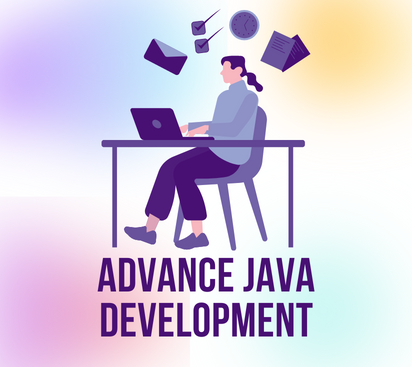

Short Overview
It is a part of Java programming language. It is an advanced technology or advance version of Java specially designed to develop web-based, network-centric or enterprise applications. It includes the concepts like Servlet, JSP, JDBC, RMI, Socket programming, etc. It is a specialization in specific domain.
- Course Overview
- Web Application
- Full stack development
- Course Outline
- Introduction To JDBC
- Introduction To DBMS
- History And Editions Of JDBC
- JDBC Architecture
- How JDBC Manages Connections To The Database ?
- JDBC Packages
- Steps Required In JDBC Programming
- SQL -Database language
- Query –insert , update , delete
- Executing Non Select Queries From JDBC
- Dynamic SQL
- PreparedStatement
- Creating scrollable and updateable ResultSet
- ResultSet concurrency
- Insert update delete in Resultset
- How to retrieve date from database ?
- How to store date in the database ?
- How to insert images in the database ?
- How to retrieve images from the database ?
- Executing batch updates.
- Executing batch updates using statements.
- Executing batch update for prepared statement.
- Transaction management.
- Disconnected architecture.
- Establishing connection to database with a CachedRowSet.
- Updating the CachedRowSet.
- Inserting records in CachedRowSet.
- Deleting a record.
- Servlets Introduction
- What Is The Need Of A Servlet ?
- Servlet Container
- Request and response of Servlet
- LifeCycle Of a Servlet
- Introduction To GenericServlet class
- Creating The Sevlet.
- Introduction To HttpServlet.
- Differences With GenericServlet
- Introduction To doGet( ) and doPost( )
- Writing Servlet By Extending HttpServlet
- Calling Servlet Using HTML Page
- Methods Of ServletRequest And HttpServletRequest
- Obtaining Client Info
- Reading Form Parameters
- Connecting A Servlet To The Database
- Inter Servlet Communication
- Transferring Request
- Using Request Redirection
- Using Request Dispatching
- Using forward() and include()
- Introduction To Initialization Parameters
- Using Servlet Initialization Parameters
- Using Context Initialization Parameters
- Using Context Listener
- Introduction To JSP
- Servlet v/s JSP
- Request Processing In JSP
- JSP Tags
- Types of JSP Elements
- Scriptlet Tag
- Declarative Tags
- Expression Tag
- List Of Implicit Objects In A JSP Page
- Comments
- The MVC Model
- Introduction To JSP Directives
- The @page Directive
- Attributes of @page Directive
- The @include Directive
- Introduction To Session Tracking
- Session Tracking Mechanisms
- Using Hidden Field
- Session Tracking Using Session API
- The HttpSession Interface
- Working Of HttpSession
- Methods Of HttpSession
- Session Counter
- Session Tracking Without Cookies
- Event Handling In Session Tracking
- Introduction To Query String
- Using Cookies
- Important Methods Of Cookies
- Examples
| Advance Java (JEE) Lecture - 1.1 | Preview |
| Advance Java (JEE) Lecture - 1.2 | Preview |
| Advance Java (JEE) Lecture - 2 | Preview |
| Advance Java (JEE) Lecture - 3 | Preview |
| Advance Java (JEE) Lecture - 4 | Preview |
From Basic to Advanced Java (JEE)
- Core to Advanced Java: Deepen your Java knowledge from Basic Java to advanced Java Enterprise Edition (JEE) concepts.
- Zero to Hero: Transform yourself from a Core Java developer to a full-fledged enterprise Java developer.
- Comprehensive Coverage: Explore advanced topics including Servlets, JSP, EJB, JPA, and Web Services.
Live Lectures
- 120+ Hours: Attend live, interactive sessions taught by industry experts specializing in Java EE.
- Hands-on Practice: Apply your learning in real-time through coding exercises and live demonstrations.
- Practice Sessions: Participate in focused practice sessions to solidify your understanding of advanced Java concepts.
Doubt Solving
- Unlimited Doubt Clearing Sessions: Get all your questions resolved with support from experienced instructors.
Test Series and Assignments
- Topic-Wise Test Series: Evaluate your progress with assessments following each advanced topic.
- Assignments: Reinforce your knowledge through practical assignments that cover key JEE concepts.
Lecture Notes
- Detailed Notes: Access comprehensive notes for every lecture, detailing essential advanced Java topics.
Projects
- Enterprise-Level Projects: Work on live projects to gain experience in building enterprise-level applications.
- Design Patterns and Architecture: Implement enterprise design patterns and architectural principles in your projects.
- Integration with Web Services: Learn to integrate your applications with RESTful and SOAP web services.
Certifications
- Dual Certification: Earn two certificates upon successful completion of the course and projects.
- Advanced Java (JEE) Completion Certificate: Receive a certificate for mastering Advanced Java (JEE) concepts.
- Project Completion Certificate: Get certified for successfully completing your enterprise-level Java project.
Laptop / Computer Spefiications
- System With Minimum I3 Processor Or Better
- At Least 4 Gb Of Ram
Java Development Kit (JDK)
Integrated Development Environment (IDE)
Build Tools
Version Control
Database
Application Servers (Optional)
Documentation
Additional Libraries
Ready to kick-start your career?
Join Us Now Join Us Now



